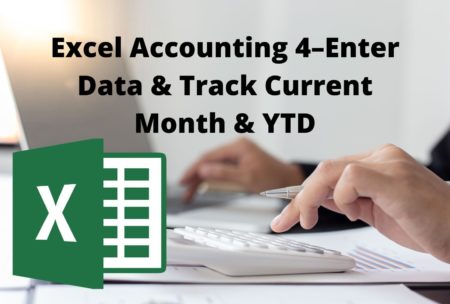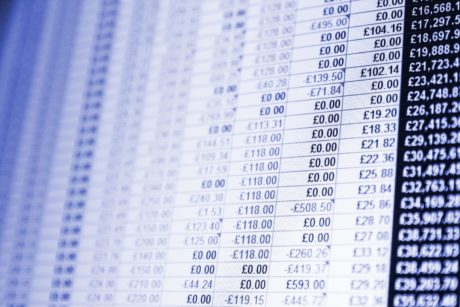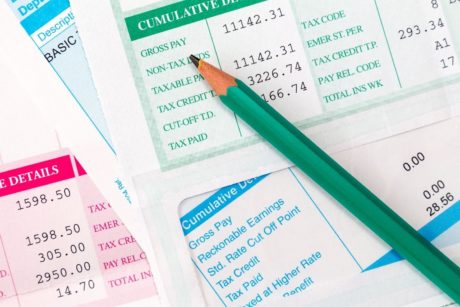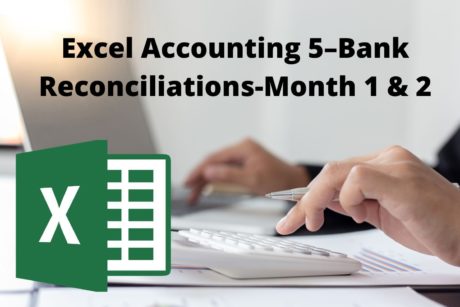Learn the basics of data entry on accounting systems using Excel. Read more.
Robert (Bob) Steele CPA, CGMA, M.S. Tax, CPI
Access all courses in our library for only $9/month with All Access Pass
Get Started with All Access PassBuy Only This CourseAbout This Course
Who this course is for:
- Business owners
- Accountants
- Business students
- Anyone who’d like to learn MS Excel
What you’ll learn:
- How to enter transactions into an accounting system using Excel
- How to create reports for the current month and for the year to date
- How to enter transactions into a general journal
- How to post transactions to a general ledger
- How to create a trial balance for the current month and the year to date
- How to create subsidiary ledgers for accounts receivable, accounts payable, and inventory
- How to create financial statements for one month and for the year to date
Requirements:
- No prior knowledge is required to take this course
This course will enter a month’s worth of data input into an accounting system using Excel, which has already been set up and includes one month of data input.
Learners will learn how to navigate Microsoft Excel and use a well-designed accounting worksheet, complete with a general journal, trial balance, general ledger, subsidiary ledgers for accounts receivable, accounts payable, inventory, financial statements, and much more.
Excel is an excellent tool to learn accounting because it is much more transparent than a database program, like accounting software. QuickBooks is a typical example of accounting software.
For most new steps in our accounting practice problem, you will have access to a downloadable Excel Workbook containing at least two tabs, one with the answer, the new tasks completed, and the other starting where the prior presentation left off.
As we enter the second month of data input, we will analyze the current month’s data and the year-to-date data. We will use Excel to understand how accounting software like QuickBooks generates reports for different periods, including reports for one month, multiple months, and comparative reports.
The course will demonstrate transactions for each accounting cycle, the revenue cycle, the purchases cycle, and the payroll cycle.
We will enter transactions into the general journal, the general ledger, subsidiary ledgers, the trial balance, and the financial statements.
Learners will create financial statements for the current month and the year-to-date data.
Our Promise to You
By the end of this course, you will have learned to input data into an accounting system using MS Excel.
10 Day Money Back Guarantee. If you are unsatisfied for any reason, simply contact us and we’ll give you a full refund. No questions asked.
Get started today!
Course Curriculum
| Section 1: Month 2 - Enter Loan Transaction, Create Amortization Table, & Investment | |||
| Excel Accounting 4 - Excel Worksheet | 00:00:00 | ||
| 8005 Format Worksheet For New Month | 00:00:00 | ||
| 8020 Make Amortization Table | 00:00:00 | ||
| 8022 Make Loan Payments | 00:00:00 | ||
| 8040 Short Term Investment Sales & Gains | 00:00:00 | ||
| Section 2: Month 2 - Enter Sale, Cash Received At Same Time & Bill For Inventory | |||
| Excel Accounting 4 - Excel Worksheet | 00:00:00 | ||
| 8120 Sales Receipt & Deposit | 00:00:00 | ||
| 8122 Record Receipt Of Inventory With Bill Linked To P.O | 00:00:00 | ||
| Section 3: Month 2 - Invoices For Service Sales & Advanced Customer Deposit | |||
| Excel Accounting 4 - Excel Worksheet | 00:00:00 | ||
| 8130 Populate Invoice Using Billable Item That Was Created From P.O. | 00:00:00 | ||
| 8140 Advanced Customer Payment Or Unearned Revenue Method 1 | 00:00:00 | ||
| 8160 Apply Customer Deposit (Credit) To Invoice | 00:00:00 | ||
| 8200 Advanced Customer Payment Or Unearned Revenue Method 2 | 00:00:00 | ||
| Section 4: Months 2 - Transactions For Billable Time | |||
| Excel Accounting 4 - Excel Worksheet | 00:00:00 | ||
| 8320 Bill For Hourly Services Of Staff Set Up Items & Enter Billable Time | 00:00:00 | ||
| 8322 Create Invoices Using Billable Time | 00:00:00 | ||
| Section 5: Month 2 - Rental Income Transaction & Advanced Customer Deposit | |||
| Excel Accounting 4 - Excel Worksheet | 00:00:00 | ||
| 8342 Rental Income Customer Deposit | 00:00:00 | ||
| 8344 Rental Income Estimate & Invoice | 00:00:00 | ||
| Section 6: Month 2 - Purchase & Finance Equipment | |||
| Excel Accounting 4 - Excel Worksheet | 00:00:00 | ||
| 8360 Purchase & Finance Equipment | 00:00:00 | ||
| 8362 Subaccounts Categories For Fixed Assets | 00:00:00 | ||
| Section 7: Month 2 - Enter & Pay Month End Bills & Pay Sales Tax | |||
| Excel Accounting 4 - Excel Worksheet | 00:00:00 | ||
| 8365 Bills - Enter, Sort, & Pay | 00:00:00 | ||
| 8370 Pay Sales Tax | 00:00:00 | ||
| Section 8: Month 2 - Enter Payroll & Pay Payroll Tax For Prior Period | |||
| Excel Accounting 4 - Excel Worksheet | 00:00:00 | ||
| 8380 Enter Payroll For Second Month Part 1 | 00:00:00 | ||
| 8381 Enter Payroll For Second Month Part 2 | 00:00:00 | ||
| 8385 Pay Payroll Taxes | 00:00:00 | ||
| Section 9: Month 2 - Financial Statements | |||
| Excel Accounting 4 - Excel Worksheet | 00:00:00 | ||
| 8420 Create Reports After Second Month Of Data Input Ytd | 00:00:00 | ||
| 8421 Create Reports After Second Month Of Data Month Of February Only | 00:00:00 | ||
About This Course
Who this course is for:
- Business owners
- Accountants
- Business students
- Anyone who’d like to learn MS Excel
What you’ll learn:
- How to enter transactions into an accounting system using Excel
- How to create reports for the current month and for the year to date
- How to enter transactions into a general journal
- How to post transactions to a general ledger
- How to create a trial balance for the current month and the year to date
- How to create subsidiary ledgers for accounts receivable, accounts payable, and inventory
- How to create financial statements for one month and for the year to date
Requirements:
- No prior knowledge is required to take this course
This course will enter a month’s worth of data input into an accounting system using Excel, which has already been set up and includes one month of data input.
Learners will learn how to navigate Microsoft Excel and use a well-designed accounting worksheet, complete with a general journal, trial balance, general ledger, subsidiary ledgers for accounts receivable, accounts payable, inventory, financial statements, and much more.
Excel is an excellent tool to learn accounting because it is much more transparent than a database program, like accounting software. QuickBooks is a typical example of accounting software.
For most new steps in our accounting practice problem, you will have access to a downloadable Excel Workbook containing at least two tabs, one with the answer, the new tasks completed, and the other starting where the prior presentation left off.
As we enter the second month of data input, we will analyze the current month’s data and the year-to-date data. We will use Excel to understand how accounting software like QuickBooks generates reports for different periods, including reports for one month, multiple months, and comparative reports.
The course will demonstrate transactions for each accounting cycle, the revenue cycle, the purchases cycle, and the payroll cycle.
We will enter transactions into the general journal, the general ledger, subsidiary ledgers, the trial balance, and the financial statements.
Learners will create financial statements for the current month and the year-to-date data.
Our Promise to You
By the end of this course, you will have learned to input data into an accounting system using MS Excel.
10 Day Money Back Guarantee. If you are unsatisfied for any reason, simply contact us and we’ll give you a full refund. No questions asked.
Get started today!
Course Curriculum
| Section 1: Month 2 - Enter Loan Transaction, Create Amortization Table, & Investment | |||
| Excel Accounting 4 - Excel Worksheet | 00:00:00 | ||
| 8005 Format Worksheet For New Month | 00:00:00 | ||
| 8020 Make Amortization Table | 00:00:00 | ||
| 8022 Make Loan Payments | 00:00:00 | ||
| 8040 Short Term Investment Sales & Gains | 00:00:00 | ||
| Section 2: Month 2 - Enter Sale, Cash Received At Same Time & Bill For Inventory | |||
| Excel Accounting 4 - Excel Worksheet | 00:00:00 | ||
| 8120 Sales Receipt & Deposit | 00:00:00 | ||
| 8122 Record Receipt Of Inventory With Bill Linked To P.O | 00:00:00 | ||
| Section 3: Month 2 - Invoices For Service Sales & Advanced Customer Deposit | |||
| Excel Accounting 4 - Excel Worksheet | 00:00:00 | ||
| 8130 Populate Invoice Using Billable Item That Was Created From P.O. | 00:00:00 | ||
| 8140 Advanced Customer Payment Or Unearned Revenue Method 1 | 00:00:00 | ||
| 8160 Apply Customer Deposit (Credit) To Invoice | 00:00:00 | ||
| 8200 Advanced Customer Payment Or Unearned Revenue Method 2 | 00:00:00 | ||
| Section 4: Months 2 - Transactions For Billable Time | |||
| Excel Accounting 4 - Excel Worksheet | 00:00:00 | ||
| 8320 Bill For Hourly Services Of Staff Set Up Items & Enter Billable Time | 00:00:00 | ||
| 8322 Create Invoices Using Billable Time | 00:00:00 | ||
| Section 5: Month 2 - Rental Income Transaction & Advanced Customer Deposit | |||
| Excel Accounting 4 - Excel Worksheet | 00:00:00 | ||
| 8342 Rental Income Customer Deposit | 00:00:00 | ||
| 8344 Rental Income Estimate & Invoice | 00:00:00 | ||
| Section 6: Month 2 - Purchase & Finance Equipment | |||
| Excel Accounting 4 - Excel Worksheet | 00:00:00 | ||
| 8360 Purchase & Finance Equipment | 00:00:00 | ||
| 8362 Subaccounts Categories For Fixed Assets | 00:00:00 | ||
| Section 7: Month 2 - Enter & Pay Month End Bills & Pay Sales Tax | |||
| Excel Accounting 4 - Excel Worksheet | 00:00:00 | ||
| 8365 Bills - Enter, Sort, & Pay | 00:00:00 | ||
| 8370 Pay Sales Tax | 00:00:00 | ||
| Section 8: Month 2 - Enter Payroll & Pay Payroll Tax For Prior Period | |||
| Excel Accounting 4 - Excel Worksheet | 00:00:00 | ||
| 8380 Enter Payroll For Second Month Part 1 | 00:00:00 | ||
| 8381 Enter Payroll For Second Month Part 2 | 00:00:00 | ||
| 8385 Pay Payroll Taxes | 00:00:00 | ||
| Section 9: Month 2 - Financial Statements | |||
| Excel Accounting 4 - Excel Worksheet | 00:00:00 | ||
| 8420 Create Reports After Second Month Of Data Input Ytd | 00:00:00 | ||
| 8421 Create Reports After Second Month Of Data Month Of February Only | 00:00:00 | ||




